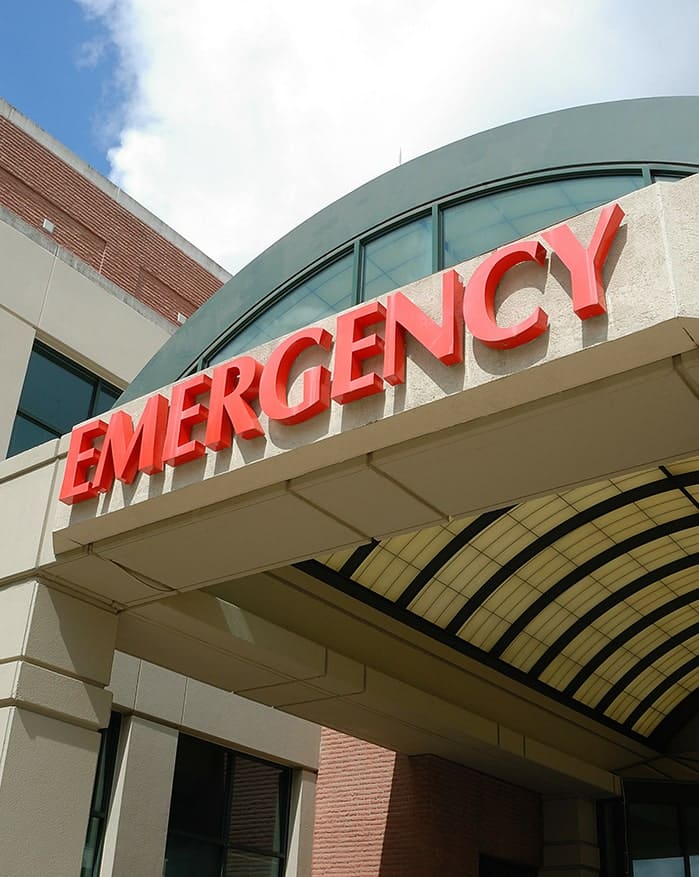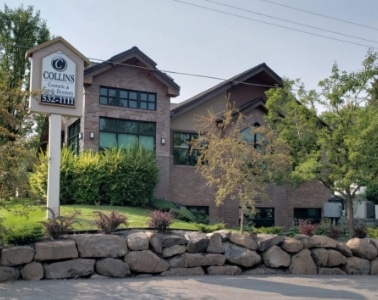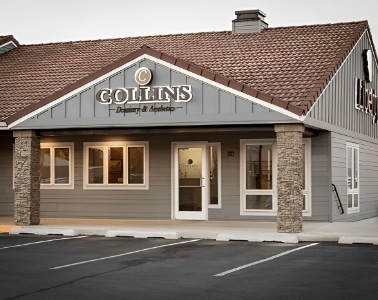At Collins Dentistry & Aesthetics, we’re here for our patients at all times, especially during dental emergencies. Unfortunately, oral health isn’t always predictable. Taking a bad fall or getting into a car accident can cause you to knock out or damage a tooth, or an untreated cavity might lead to a tooth infection.
Regardless of the circumstances of your dental emergency, our dentists in Spokane, WA, are available to help. With over two decades of experience, we can assess your symptoms and create a personalized treatment plan.
If you believe you have a dental emergency and require immediate attention, please contact our dental office in Spokane today.

What’s Considered a Dental Emergency?
There are several types of conditions we would consider dental emergencies. Generally, any oral health problem that causes severe pain, excessive bleeding, infection, or a loose or missing tooth is an indication that you’ll need to call a Spokane emergency dentist. Some of the most common types of dental emergencies that require same-day treatment are listed below.
Knocked-Out Tooth
When a tooth is knocked out, it’s crucial to seek medical attention as soon as possible to reattach it. There is a one- to two-hour window before it will not reattach.
If you knock out a tooth, stay calm. Rinse your mouth with warm water, then apply gauze with gentle pressure to stop the bleeding. Look for the tooth and carefully pick it up by the crown (top) and rinse it in water. Then, place the tooth in a cup of milk, saliva, or water with a pinch of salt.
Damaged or Lost Crowns, Veneers, Bridges, or Fillings
If a dental restoration, such as a crown, bridge, veneer, or filling, becomes lost or damaged, our Spokane dentists will need to treat you promptly. This is especially true if the restoration comes completely off.
The purpose of a restoration is to enhance your tooth’s strength and health or replace it altogether. When the restoration becomes damaged, it’s just as bad as damaging a natural tooth.
Please contact our dental office if one of your restorations becomes damaged. The sooner we address the issues, the less likely it is to cause problems with your other teeth and gums. If a crown, veneer, bridge, or filling becomes loose or falls out, you can secure it with sugar-free chewing gum until you can visit our dental office in Spokane.
Abscesses or Swelling
Another dental emergency that requires immediate attention is a tooth abscess.
Tooth abscesses occur when a bacterial infection causes a pocket filled with pus to develop near the top of the tooth root or adjacent to the tooth on the gums. These issues can occur due to poor oral hygiene, untreated cavities, dry mouth, a high-sugar diet, or tooth injury.
Common symptoms of a tooth abscess include sensitivity to temperature and pressure, facial swelling, fever, and throbbing pain. When a ruptured abscess occurs, it’s common to experience a sudden rush of pain relief followed by a foul taste in your mouth. This is the release of salty fluid inside the abscess due to its rupture.
Toothaches
Toothaches are among the top dental emergencies we see at Collins Dentistry & Aesthetics.
Before contacting us about a toothache, check to see if there are any pieces of food or debris lodged in your teeth. You can try to dislodge anything that’s stuck by swishing water around in your mouth, brushing your teeth, and flossing.
If the toothache doesn’t go away after trying this, there’s likely something else going on, and you should contact our dentists.

Chipped, Broken, and Dislodged Tooth
If a tooth has become partially dislodged from its socket, please contact us for an immediate visit. Until you reach our office, apply a cold compress to the outside of your mouth, specifically on the cheek, to help reduce swelling.
If a tooth or teeth have chipped or broken, you’ll need to see a dentist right away. Chipped and broken teeth have the potential to introduce bacteria into your mouth and, eventually, your gums, causing more severe, whole-body issues.
Severe Mouth Pain
Severe mouth pain is a strong indication that something isn’t quite right. It’s not worth it to suffer from severe mouth pain because it’s not likely to go away on its own.
You might need a root canal, dental crown, or dental filling to repair or replace the tooth that is causing pain. You might also experience severe mouth pain from swollen or lacerated gums.
Suspicious Spots on Gums or Teeth
A suspicious spot on your gums might be a canker sore, but if it is, you’ll likely recognize it as such. If you don’t think it’s a canker sore, call your emergency dentist in Spokane. Suspicious spots on your gums may indicate larger issues, such as periodontal disease (gum disease) or oral cancer.
Orthodontic Emergency
Although an orthodontic emergency usually doesn’t cause severe pain or bleeding, it can disrupt your treatment. If you break a bracket or have a poking wire from your braces, or damage or lose an Invisalign® aligner, it’s an emergency.
Why Choose Collins Dentistry & Aesthetics?
When a dental emergency strikes, Collins Dentistry & Aesthetics offers trusted, compassionate care. Drs. Ken and Marnie Collins bring over 25 years of experience to the practice, which combines advanced training from prestigious global institutes with a genuine dedication to patients.
Dr. Ken Collins and Dr. Marnie Collins have also been consistently recognized as Spokane’s Best Dentist/Cosmetic Dentist. Their skilled team ensures patients receive prompt, expert attention in urgent situations, backed by a reputation for excellence and a legacy of family-centered dental care.

FAQs
How Do I Handle an Injury to My Lips, Cheeks, or Tongue?
Soft tissue injuries inside the mouth can bleed heavily due to the rich blood supply, but most are not life-threatening. Start by rinsing the area gently with warm salt water to keep it clean. Apply a clean cloth or sterile gauze with light pressure to stop bleeding. Cold compresses outside the mouth may also help reduce swelling and discomfort.
If bleeding doesn’t stop after 10–15 minutes, or if the cut is deep, seek emergency dental or medical care. Avoid aspirin, which can thin the blood and worsen bleeding. Immediate professional attention may be needed if stitches or further treatment are required.
Is Sensitivity to Hot and Cold Foods Ever Considered an Emergency?
Mild sensitivity to temperature changes is common and usually not an emergency. It may be linked to worn enamel, minor gum recession, or a small cavity.
If sensitivity suddenly appears, worsens quickly, or is accompanied by severe toothache, swelling, or visible damage, it may indicate a more serious problem, such as an infection, a cracked tooth, or an exposed root. In those cases, prompt dental evaluation is recommended to prevent complications.
While waiting to see a dentist, try using desensitizing toothpaste and avoid very hot, cold, or sweet foods. Persistent or worsening sensitivity should never be ignored – they may indicate a serious underlying issue.
What Should I Do if My Dental Emergency Happens While I’m Traveling?
Dental emergencies can be especially stressful when you’re away from home. Start by managing immediate symptoms:
- Rinse your mouth with clean water
- Apply cold compresses to reduce swelling
- Take over-the-counter pain relievers if needed
If you lose or break a tooth, store it in milk or saliva to preserve it until you find a dentist. Contact your travel insurance provider or hotel concierge, who may be able to recommend local dental clinics. In serious cases, seek urgent care at the nearest emergency department or hospital.
Once stabilized, notify your regular dentist so they can coordinate any follow-up care when you return home.
What Should I Do If I Break My Dentures or Partial Dentures?
A broken denture or partial can affect your ability to eat, speak, and feel comfortable.
Avoid using household glues or DIY fixes, as these can damage the appliance further or cause harm if ingested. If possible, keep all broken pieces in a secure container and bring them to your dentist.
If the denture causes irritation or sores, remove it until the issue is resolved. In the meantime, opt for soft foods and avoid chewing with the broken appliance. Quick professional repair will restore comfort and function.
What Can I Do to Avoid Future Dental Emergencies?
Prevention begins with a consistent and thorough oral hygiene routine. This includes brushing twice daily, flossing, and visiting your dentist regularly for exams and cleanings.
Some other steps you can take include:
- Using a mouthguard during sports to protect teeth from trauma.
- Wearing a nightguard to reduce damage from teeth grinding.
- Avoiding chewing hard items like ice, pens, or popcorn kernels, which can crack teeth or damage restorations.
- Staying mindful of changes such as tooth sensitivity, small chips, or gum swelling, and addressing them early before they escalate into emergencies.
- Eating a diet rich in calcium and low in sugar to support long-term dental health and reduce the risk of sudden issues.
Mitigate Your Dental Emergency in Spokane
Do you have a dental emergency in Spokane? Don’t worry, our dentists, Drs. Ken and Marie Collins are available to help. Please stay calm and contact us at 509-532-1111 or 509-927-2273 (be sure to tell us that you’re experiencing an emergency).



